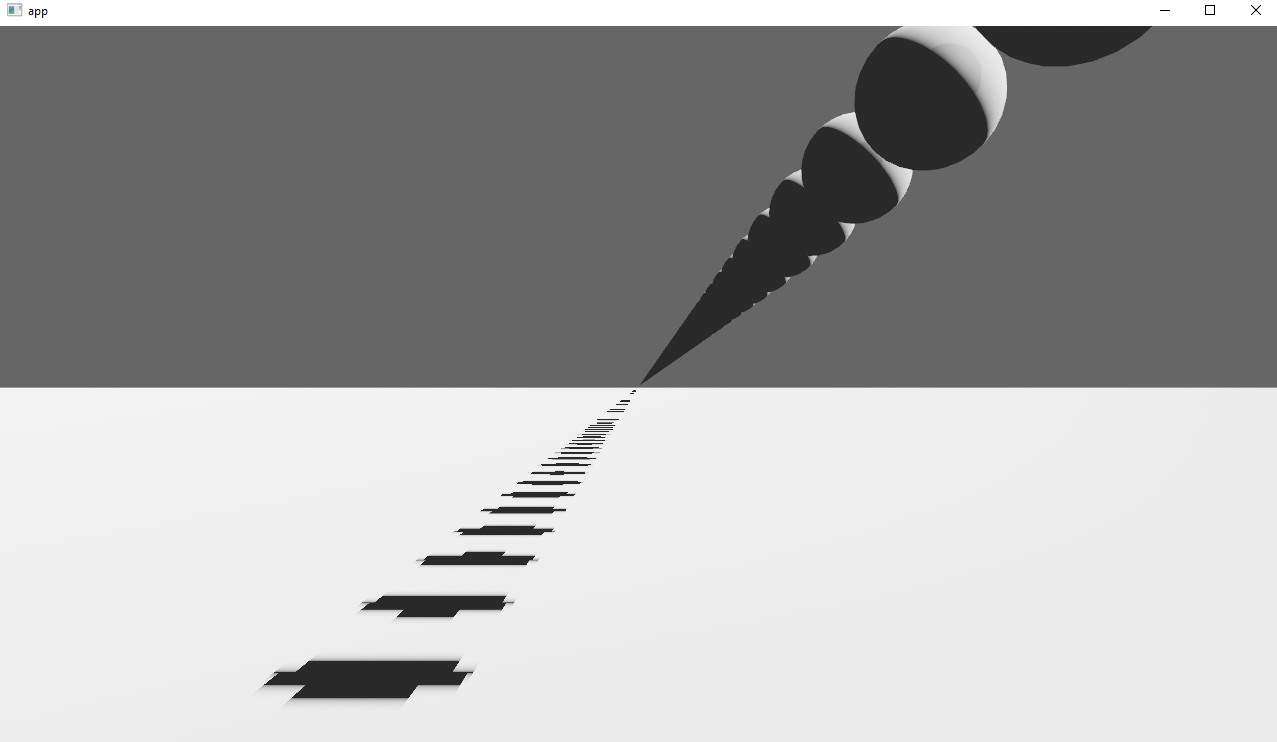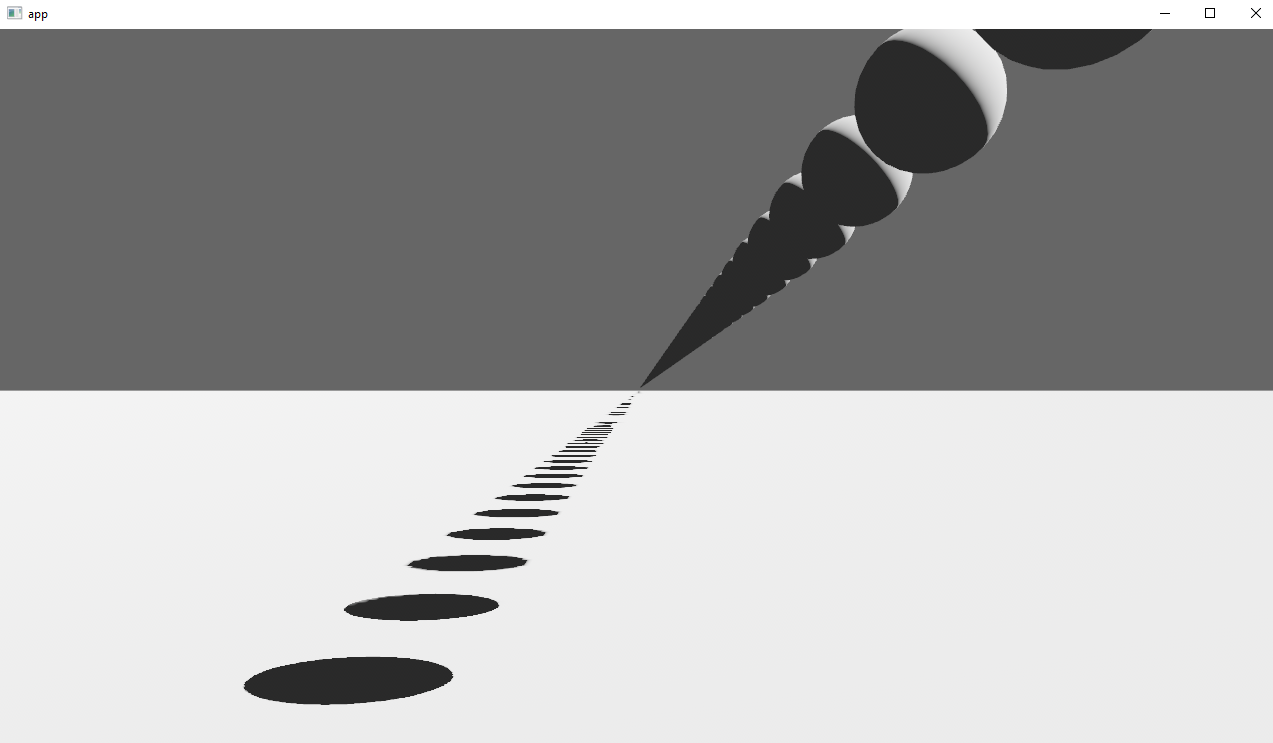mirror of
https://github.com/bevyengine/bevy
synced 2025-02-18 15:08:36 +00:00
Co-authored-by: Robert Swain <robert.swain@gmail.com> # Objective Implements cascaded shadow maps for directional lights, which produces better quality shadows without needing excessively large shadow maps. Fixes #3629 Before  After  ## Solution Rather than rendering a single shadow map for directional light, the view frustum is divided into a series of cascades, each of which gets its own shadow map. The correct cascade is then sampled for shadow determination. --- ## Changelog Directional lights now use cascaded shadow maps for improved shadow quality. ## Migration Guide You no longer have to manually specify a `shadow_projection` for a directional light, and these settings should be removed. If customization of how cascaded shadow maps work is desired, modify the `CascadeShadowConfig` component instead.
289 lines
9.1 KiB
Rust
289 lines
9.1 KiB
Rust
//! A glTF scene viewer plugin. Provides controls for animation, directional lighting, and switching between scene cameras.
|
|
//! To use in your own application:
|
|
//! - Copy the code for the `SceneViewerPlugin` and add the plugin to your App.
|
|
//! - Insert an initalized `SceneHandle` resource into your App's `AssetServer`.
|
|
|
|
use bevy::{asset::LoadState, gltf::Gltf, prelude::*, scene::InstanceId};
|
|
|
|
use std::f32::consts::*;
|
|
use std::fmt;
|
|
|
|
use super::camera_controller_plugin::*;
|
|
|
|
#[derive(Resource)]
|
|
pub struct SceneHandle {
|
|
gltf_handle: Handle<Gltf>,
|
|
scene_index: usize,
|
|
#[cfg(feature = "animation")]
|
|
animations: Vec<Handle<AnimationClip>>,
|
|
instance_id: Option<InstanceId>,
|
|
pub is_loaded: bool,
|
|
pub has_light: bool,
|
|
}
|
|
|
|
impl SceneHandle {
|
|
pub fn new(gltf_handle: Handle<Gltf>, scene_index: usize) -> Self {
|
|
Self {
|
|
gltf_handle,
|
|
scene_index,
|
|
#[cfg(feature = "animation")]
|
|
animations: Vec::new(),
|
|
instance_id: None,
|
|
is_loaded: false,
|
|
has_light: false,
|
|
}
|
|
}
|
|
}
|
|
|
|
impl fmt::Display for SceneHandle {
|
|
fn fmt(&self, f: &mut fmt::Formatter<'_>) -> fmt::Result {
|
|
write!(
|
|
f,
|
|
"
|
|
Scene Controls:
|
|
L - animate light direction
|
|
U - toggle shadows
|
|
C - cycle through the camera controller and any cameras loaded from the scene
|
|
|
|
Space - Play/Pause animation
|
|
Enter - Cycle through animations
|
|
"
|
|
)
|
|
}
|
|
}
|
|
|
|
pub struct SceneViewerPlugin;
|
|
|
|
impl Plugin for SceneViewerPlugin {
|
|
fn build(&self, app: &mut App) {
|
|
app.init_resource::<CameraTracker>()
|
|
.add_system_to_stage(CoreStage::PreUpdate, scene_load_check)
|
|
.add_system(update_lights)
|
|
.add_system(camera_tracker);
|
|
|
|
#[cfg(feature = "animation")]
|
|
app.add_system(start_animation)
|
|
.add_system(keyboard_animation_control);
|
|
}
|
|
}
|
|
|
|
fn scene_load_check(
|
|
asset_server: Res<AssetServer>,
|
|
mut scenes: ResMut<Assets<Scene>>,
|
|
gltf_assets: ResMut<Assets<Gltf>>,
|
|
mut scene_handle: ResMut<SceneHandle>,
|
|
mut scene_spawner: ResMut<SceneSpawner>,
|
|
) {
|
|
match scene_handle.instance_id {
|
|
None => {
|
|
if asset_server.get_load_state(&scene_handle.gltf_handle) == LoadState::Loaded {
|
|
let gltf = gltf_assets.get(&scene_handle.gltf_handle).unwrap();
|
|
if gltf.scenes.len() > 1 {
|
|
info!(
|
|
"Displaying scene {} out of {}",
|
|
scene_handle.scene_index,
|
|
gltf.scenes.len()
|
|
);
|
|
info!("You can select the scene by adding '#Scene' followed by a number to the end of the file path (e.g '#Scene1' to load the second scene).");
|
|
}
|
|
|
|
let gltf_scene_handle =
|
|
gltf.scenes
|
|
.get(scene_handle.scene_index)
|
|
.unwrap_or_else(|| {
|
|
panic!(
|
|
"glTF file doesn't contain scene {}!",
|
|
scene_handle.scene_index
|
|
)
|
|
});
|
|
let scene = scenes.get_mut(gltf_scene_handle).unwrap();
|
|
|
|
let mut query = scene
|
|
.world
|
|
.query::<(Option<&DirectionalLight>, Option<&PointLight>)>();
|
|
scene_handle.has_light =
|
|
query
|
|
.iter(&scene.world)
|
|
.any(|(maybe_directional_light, maybe_point_light)| {
|
|
maybe_directional_light.is_some() || maybe_point_light.is_some()
|
|
});
|
|
|
|
scene_handle.instance_id =
|
|
Some(scene_spawner.spawn(gltf_scene_handle.clone_weak()));
|
|
|
|
#[cfg(feature = "animation")]
|
|
{
|
|
scene_handle.animations = gltf.animations.clone();
|
|
if !scene_handle.animations.is_empty() {
|
|
info!(
|
|
"Found {} animation{}",
|
|
scene_handle.animations.len(),
|
|
if scene_handle.animations.len() == 1 {
|
|
""
|
|
} else {
|
|
"s"
|
|
}
|
|
);
|
|
}
|
|
}
|
|
|
|
info!("Spawning scene...");
|
|
}
|
|
}
|
|
Some(instance_id) if !scene_handle.is_loaded => {
|
|
if scene_spawner.instance_is_ready(instance_id) {
|
|
info!("...done!");
|
|
scene_handle.is_loaded = true;
|
|
}
|
|
}
|
|
Some(_) => {}
|
|
}
|
|
}
|
|
|
|
#[cfg(feature = "animation")]
|
|
fn start_animation(
|
|
mut player: Query<&mut AnimationPlayer>,
|
|
mut done: Local<bool>,
|
|
scene_handle: Res<SceneHandle>,
|
|
) {
|
|
if !*done {
|
|
if let Ok(mut player) = player.get_single_mut() {
|
|
if let Some(animation) = scene_handle.animations.first() {
|
|
player.play(animation.clone_weak()).repeat();
|
|
*done = true;
|
|
}
|
|
}
|
|
}
|
|
}
|
|
|
|
#[cfg(feature = "animation")]
|
|
fn keyboard_animation_control(
|
|
keyboard_input: Res<Input<KeyCode>>,
|
|
mut animation_player: Query<&mut AnimationPlayer>,
|
|
scene_handle: Res<SceneHandle>,
|
|
mut current_animation: Local<usize>,
|
|
mut changing: Local<bool>,
|
|
) {
|
|
if scene_handle.animations.is_empty() {
|
|
return;
|
|
}
|
|
|
|
if let Ok(mut player) = animation_player.get_single_mut() {
|
|
if keyboard_input.just_pressed(KeyCode::Space) {
|
|
if player.is_paused() {
|
|
player.resume();
|
|
} else {
|
|
player.pause();
|
|
}
|
|
}
|
|
|
|
if *changing {
|
|
// change the animation the frame after return was pressed
|
|
*current_animation = (*current_animation + 1) % scene_handle.animations.len();
|
|
player
|
|
.play(scene_handle.animations[*current_animation].clone_weak())
|
|
.repeat();
|
|
*changing = false;
|
|
}
|
|
|
|
if keyboard_input.just_pressed(KeyCode::Return) {
|
|
// delay the animation change for one frame
|
|
*changing = true;
|
|
// set the current animation to its start and pause it to reset to its starting state
|
|
player.set_elapsed(0.0).pause();
|
|
}
|
|
}
|
|
}
|
|
|
|
fn update_lights(
|
|
key_input: Res<Input<KeyCode>>,
|
|
time: Res<Time>,
|
|
mut query: Query<(&mut Transform, &mut DirectionalLight)>,
|
|
mut animate_directional_light: Local<bool>,
|
|
) {
|
|
for (_, mut light) in &mut query {
|
|
if key_input.just_pressed(KeyCode::U) {
|
|
light.shadows_enabled = !light.shadows_enabled;
|
|
}
|
|
}
|
|
|
|
if key_input.just_pressed(KeyCode::L) {
|
|
*animate_directional_light = !*animate_directional_light;
|
|
}
|
|
if *animate_directional_light {
|
|
for (mut transform, _) in &mut query {
|
|
transform.rotation = Quat::from_euler(
|
|
EulerRot::ZYX,
|
|
0.0,
|
|
time.elapsed_seconds() * PI / 15.0,
|
|
-FRAC_PI_4,
|
|
);
|
|
}
|
|
}
|
|
}
|
|
|
|
#[derive(Resource, Default)]
|
|
struct CameraTracker {
|
|
active_index: Option<usize>,
|
|
cameras: Vec<Entity>,
|
|
}
|
|
|
|
impl CameraTracker {
|
|
fn track_camera(&mut self, entity: Entity) -> bool {
|
|
self.cameras.push(entity);
|
|
if self.active_index.is_none() {
|
|
self.active_index = Some(self.cameras.len() - 1);
|
|
true
|
|
} else {
|
|
false
|
|
}
|
|
}
|
|
|
|
fn active_camera(&self) -> Option<Entity> {
|
|
self.active_index.map(|i| self.cameras[i])
|
|
}
|
|
|
|
fn set_next_active(&mut self) -> Option<Entity> {
|
|
let active_index = self.active_index?;
|
|
let new_i = (active_index + 1) % self.cameras.len();
|
|
self.active_index = Some(new_i);
|
|
Some(self.cameras[new_i])
|
|
}
|
|
}
|
|
|
|
fn camera_tracker(
|
|
mut camera_tracker: ResMut<CameraTracker>,
|
|
keyboard_input: Res<Input<KeyCode>>,
|
|
mut queries: ParamSet<(
|
|
Query<(Entity, &mut Camera), (Added<Camera>, Without<CameraController>)>,
|
|
Query<(Entity, &mut Camera), (Added<Camera>, With<CameraController>)>,
|
|
Query<&mut Camera>,
|
|
)>,
|
|
) {
|
|
// track added scene camera entities first, to ensure they are preferred for the
|
|
// default active camera
|
|
for (entity, mut camera) in queries.p0().iter_mut() {
|
|
camera.is_active = camera_tracker.track_camera(entity);
|
|
}
|
|
|
|
// iterate added custom camera entities second
|
|
for (entity, mut camera) in queries.p1().iter_mut() {
|
|
camera.is_active = camera_tracker.track_camera(entity);
|
|
}
|
|
|
|
if keyboard_input.just_pressed(KeyCode::C) {
|
|
// disable currently active camera
|
|
if let Some(e) = camera_tracker.active_camera() {
|
|
if let Ok(mut camera) = queries.p2().get_mut(e) {
|
|
camera.is_active = false;
|
|
}
|
|
}
|
|
|
|
// enable next active camera
|
|
if let Some(e) = camera_tracker.set_next_active() {
|
|
if let Ok(mut camera) = queries.p2().get_mut(e) {
|
|
camera.is_active = true;
|
|
}
|
|
}
|
|
}
|
|
}
|